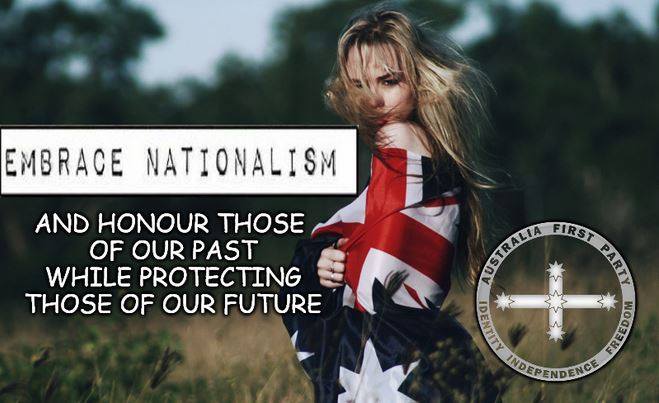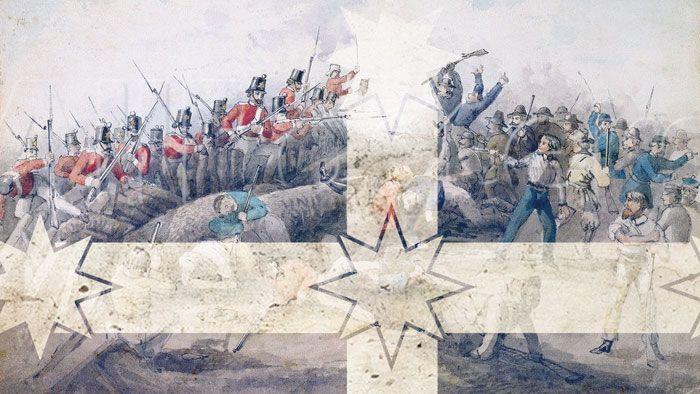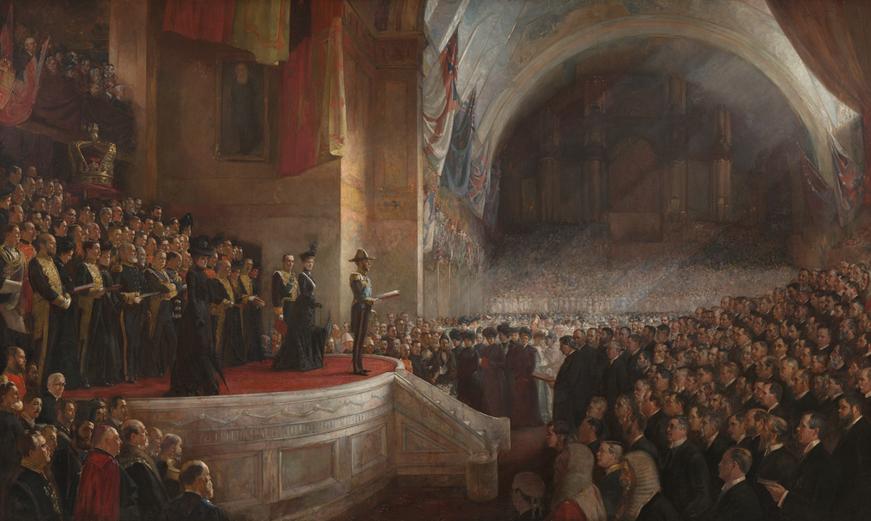
Nationalism is a political, social, and economic ideology and movement, very distinct from Left-Right globalist politics.
Nationalism is fundamentally about promoting the national interests and its ordinary people above all comers and foreign others. Nationalism is an extension of the respect and honour to our forebears and to their sacrificed legacy, while safeguarding our broader home (backyard, neighbourhood, locality, region, state, country and protecting and building personal resilience and fortitude in those of our future.
What must be the goal and outcome of nationalism is for the native-born people to gain total sovereignty over their nation and to be truly independent and free of all other vested interest and foreign power and influence.
That’s basically it. It’s more than national flag waving and marches on the national day. It’s a deep personal commitment to one’s birth nation or sworn adopted nation.
National pride and patriotism is an extension of belonging to family, kin and community. It’s when individuals by choice and passion unite as a national people in the interests of their area, region, nation and legitimate territories (like Australia’s 200 mile fishing grounds that deny all others).
Nationalism is never imposed. It must be a voluntary commitment to a homeland (upbringing, common language, culture, values, standards, beliefs, traditions, customs, music, food, art, sport, ways of life, vernacular, etc). Nationalism offers security of home family and wealth, for its is a trusted alliance between grassroots native-born locals and citizens who share the same sentiment. Nationalism extends and deepens to an ideological movement of commitment to nation – actively pursuing the ethic to protect and enhance national identity, maintain (or restore) sovereign independence and to uphold (reclaim) the individual freedoms of the nation’s distinct people above all others.
No more committal to one’s nation can be military service risking the ultimate sacrifice.
Nationalism is premised upon placing the rights of the nation’s people and the national interest above all other interests, surpassing individual or group interests. Nationalism a sense of national consciousness, placing primary emphasis on promotion of its culture and interests as opposed to those of other nations or supra-national groups within the nation state’s geo-territorial realm.
Types of Nationalism
Unlike generic globalist ideologies (aka Left/Right/Moderate/Greens) where a ‘one-size-fits-all’ mantra gets imposed upon the local people undemocratically; instead nationalist ideology is inherently custom-designed to suit the aspirations and needs of ordinary native patriots. This is because it is the native patriots who are entrusted shape and decide the type and specifics of nationalism to best serve the nation and with it, the native-born patriots.
It’s a simple but effective concept and ideology. The design is malleable. If the ordinary people want to change things, they vote and things get changed. Powerful globalist interests have no say.
When a native-born begins to explore his/her national loyalty deeper beyond patriotism and into the ideology of nationalism, complexity and choice present. The world is a complex place of hundreds of nations that have emerged and evolved in very different societies, who have uniquely in many respects fashioned their own brands of nationalism in response to specific geo-political variables and circumstances in order to achieve native-born aspirations for freedom and independence.
Nationalism may manifest itself as part of official state ideology or as a popular non-state movement and may be expressed along quite differing bases – geo-territorial, ethnic, cultural, civic, etc. The following types of demonstrated nationalism have been demonstrated in the birth of nation states around the globe:
- Territorial Nationalism
- Ethnic Nationalism
- Ethno-territorial Nationalism
- Cultural Nationalism
- Romantic Nationalism
- Dominion Nationalism.
- Liberation Nationalism
Territorial Nationalism
Territorial nationalism describes a form of nationalism based on the belief that all inhabitants of a particular geographic territory ought to unite and share a common national identity, regardless of their ethnic, linguistic, religious, cultural and other differences. Depending on the political or administrative status of a particular territory, territorial nationalism can be manifested on two basic levels, as territorial nationalism of distinctive sovereign states, or territorial nationalism of distinctive sub-sovereign regions (regional nationalism).
Within sovereign nation states, territorial nationalism is manifested as a belief that all inhabitants of that nation owe allegiance to their country of birth or adoption.
According to territorial nationalism every individual must belong to a nation, but can choose which one to join. A sacred quality is sought in this nation and in the popular memories it evokes, and citizenship is idealised and criteria set based upon established mass, public culture based on common values and traditions of the population.
Territorial nationalism is also connected to the concepts of Lebensraum, forced expulsion, ethnic cleansing and sometimes even genocide when one nation claims a certain imaginary territory and wants to get rid of other nations living on it. These territorial aspirations are part of the goal of an ethnically pure nation-state. Most Third World nations follow the ideology of territorial nationalism.
Yugoslavia tried this and it ultimately led to ethnic civil war and genocide between 1991 and 2001.
Ethnic Nationalism
Defines the nation in terms of ethnicity, which always includes some element of descent from previous generations, i.e. genophilia. It also includes ideas of a culture shared between members of the group and with their ancestors, and usually a shared language. Membership in the nation is hereditary. The state derives political legitimacy from its status as homeland of the ethnic group, and from its duty to protect of the partly national group and facilitate its family and social life, as a group. Ideas of ethnicity are very old, but modern ethnic nationalism was heavily influenced by Johann Gottfried von Herder, who promoted the concept of the Volk, and Johann Gottlieb Fichte. Theorist Anthony D. Smith uses the term ‘ethnic nationalism’ for non-Western concepts of nationalism, as opposed to Western views of a nation defined by its geographical territory. The term “ethno-nationalism” is generally used only in reference to nationalists who espouse an explicit ideology along these lines; “ethnic nationalism” is the more generic term, and used for nationalists who hold these beliefs in an informal, instinctive, or unsystematic way.
Ethno-territorial Nationalism
Ethno-territorial Nationalism is a hybrid ideology of Ethnic Nationalism and of Territorial Nationalism (above). This tends to be more historical in which a nation’s native people are defined by both local ethnicity and the historical geographical home of their ancestors.
Switzerland is a classic example, while divide by language into German, French, Italian and aboriginal Graubünden in the rugged mountainous eastward.
Cultural Nationalism
Cultural nationalism defines the nation by shared culture. Membership (the state of being members) in the nation is neither entirely voluntary (you cannot instantly acquire a culture), nor hereditary (children of members may be considered foreigners if they grew up in another culture). Yet, a traditional culture can be more easily incorporated into an individual’s life, especially if the individual is allowed to acquire its skills at an early stage of his/her own life.
Cultural nationalism has been described as a variety of nationalism that is neither purely civic nor ethnic. The nationalisms of Catalonia, Quebec and Flanders have been described as cultural.
Romantic Nationalism
Romantic nationalism, also known as organic nationalism and identity nationalism) is the form of ethnic nationalism in which the state derives political legitimacy as a natural (“organic”) consequence and expression of the nation, or ethnicity/race. It reflected the ideals of Romanticism and was opposed to Enlightenment rationalism. Romantic nationalism emphasized a historical ethnic culture which meets the Romantic Ideal; folklore developed as a Romantic nationalist concept. The Brothers Grimm were inspired by Herder’s writings to create an idealized collection of tales which they labeled as ethnically German. Historian Jules Michelet exemplifies French romantic-nationalist history.
Dominion Nationalism
Dominion Nationalism is out of colonialist dominion such as America, Canada, Australia, New Zealand, Ireland from British Rule.

In human evolution it is a relatively recent social phenomenon that emerged as a native people’s counter-response to the colonisation form of expansionism, as opposed to invasion and outright genocide.
Since the process of decolonisation that occurred after World War II, there has been a rise of Third World nationalisms. Third world nationalisms occur in those nations that have been colonized and exploited. The nationalisms of these nations were forged in a furnace that required resistance to colonial domination in order to survive. As such, resistance is part and parcel of such nationalisms and their very existence is a form of resistance to imperialist intrusions. Third World nationalism attempts to ensure that the identities of Third World peoples are authored primarily by themselves, not colonial powers.
Post-British Colonial nationalism has experienced individually different outcomes from the relative Commonwealth failures of Kenya, Rhodesia, and South Africa, to decided successfully independent nation states of Australia, New Zealand, America and Canada.
Liberation Nationalism
Many nationalist movements in the world are dedicated to national liberation in the view that their nations are being persecuted by other nations and thus need to exercise self-determination by liberating themselves from the accused persecutors.
Fake nationalist hijackings
Fakeness is tried on by usurping globalists to subdue a nation’s locals.
Fake types of nationalism include:
- Revolutionary (fake) nationalism (it’s just globalist Marxist syndicalism)
- Left-wing (fake ) nationalism (it’s just globalist leftist socialism)
- National conservatism (it’s just powerful establishment elites/oligarchs maintaining status quo power over multinationals)
- Religious (fake) nationalism (it’s just a globalist affiliation to a particular religion – like Islam
- Pan (fake) nationalism(it’s just globalism with a fabricated name)
- Diaspora nationalism (oxymoronic like the Jewish diaspora exclusively controlling wealth and influence globally while retaining their own cultural identity and shunning the host population)
- Liberal (fake) nationalism is really just multiculturalism that indiscriminately allows for unscreened foreigners to be automatically deemed citizens upon arrival, irrespective of illegitimate entry means or criminal history. This is what American President Trump is contending with the illegals wall-climbing into America from Mexico, upon which the pre-existing Leftist Democrat legislation automatically recognises the illegals and having citizen rights by the sheer fact of their entry.
- Expansionist (fake) nationalism. It really is imperialism – an aggressive militaristic form of globalism, like what the Nazi Third Reich attempted in World War II.
Globalists invent such terms to try to discredit and demonise nationalism. Anarchist globalists are just really lost ‘try-hards’ since commo utopia was white-anted in the 1980s by commo-suicidal Perestroika and Glasnost.
Australian Nationalism
In Australia, since the continent was founded in 1788 and nationalised in 1901, Australian Nationalism historically adopted characteristics of British dominion nationalism, federalism, and 1854 Eureka principles of democracy.
Contemporaneously, Australian Nationalism rejects the move to globalism since Menzies and the restoration of municipal socialism – re-nationalising public services and infrastructure that has been undemocratically privatised over the years. Australian Nationalism seeks to restore nationhood and wealth to Australians, restoring a White Australia monocultural nation-state, so reversing the imposed indiscriminate mass immigration unarmed invasion first triggered by Labor Party globalist Arthur Caldwell in 1944, and subsequently perpetuated by mass immigration zealots Ben Chifley, Harold Holt, Gough Whitlam, Malcolm Fraser, Kevin Rudd and Julia Gillard. Australian Nationalism seeks to replace introduce Direct Democracy through Citizens Initiated Referenda and other strategies.

Australia’s glory days of 1901 – Federation, monocultural White Australia, trade protectionism, a sustainable population of under 4 million, the rich lucky country.